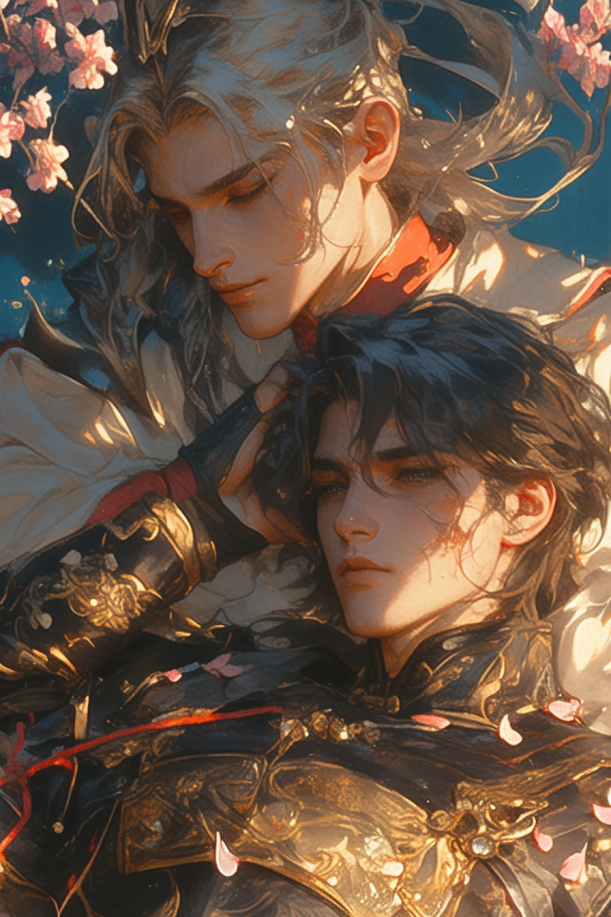Chapter 9
He felt as if a bucket of cold water had been poured over him from head to toe; the fire in his eyes, just moments ago, instantly faded into emptiness, and both his anger and vitality vanished without a trace.
The woman was none other than Grace, Charles's nominal mother.
She was no longer young, yet her beauty was undiminished. Standing in the morning light, she resembled a serene and graceful beauty in a painting.
A woman like this, even as a widow, truly shouldn't be resigned to marrying a mere centurion in a remote border town.
Grace bowed her head and gathered her robes, gracefully curtsied, and greeted William Sullivan with a polite nod, saying, "Master Sixteen."
William Sullivan only acted shamelessly with James Sullivan; when faced with women, he instantly transformed into a refined gentleman. He turned slightly, avoiding direct eye contact with Grace's face, and greeted her courteously, "Madam Xu, I'm taking Charles out for a walk."
"Thank you for your trouble," Grace smiled softly, her lips curving without showing her teeth. She then turned to Charles, gently reminding him, "Your father is coming home today. If you go out, remember to bring back a box of rouge for me."
Her voice was as light as a mosquito's buzz, a single breath could blow it away, but before Charles could reply, Deaf Sullivan had already answered for him, "Ah, madam, don't worry."
Charles: "..."
At that moment, he finally began to grasp the pattern of his foster father's deafness—anything James Sullivan said to him, he couldn't hear at all; anything others said, he heard or ignored as he pleased; but when it came to young women or even a female mosquito buzzing, he could catch every single word.
Lazy and gluttonous was one thing, but he was also a lecher!
The phrase "all that glitters is not gold" seemed tailor-made for him.
When the giant kite returned, a crowd of children hoping to pick up leftover food and villagers from miles around had gathered at the city gate to watch the spectacle. With so many people, some enterprising folks began selling snacks, and gradually, a sizable market formed, which the locals called the "Wild Goose Market."
William Sullivan never paid attention to people's expressions—even if he noticed, he pretended not to.
He seemed completely oblivious to his godson's gloomy mood, wandering around the bustling Wild Goose Market with great enthusiasm, interested in everything he saw.
Charles, burdened with worries, still had to stick close to him, always on guard so he wouldn't get lost in the crowd.
Times had been hard these past years; everyone was poor. Most of what was sold at the market were small homemade goods from local farmers—nothing tasty to eat, nothing good to drink, and boredom everywhere.
People said hard times were due to war, with taxes getting heavier every year. But in truth, there had always been wars; after each one, there was at least a period of recovery. Yet in recent years, for some reason, it seemed people never got a chance to catch their breath.
In just twenty short years, Great Liang had first campaigned north, then west, a mighty empire with envoys from all directions—what grandeur that was!
And yet, the common folk only grew poorer. It was truly strange.
Charles wandered about, bored out of his mind, just wanting to yawn, hoping this country bumpkin William Sullivan, who was curious about everything, would get his fill soon and let him go home. He'd rather go help Mr. Sullivan.
William Sullivan bought a bag of roasted, pitch-black salted beans, eating them as he walked, and, as if he had eyes in the back of his head, reached out and accurately popped a salted bean into Charles's mouth.
Caught off guard, Charles accidentally licked his finger, and in his panic, bit down on the inside of his own cheek, drawing blood. He hissed in pain and glared angrily at the troublemaker William Sullivan.
"Flowers may bloom again, but youth never returns," William Sullivan said without turning around, picking up a bean and holding it up toward the sun. His hands were truly beautiful—long and fair, like those of a nobleman's son, meant for holding books or chess pieces, completely out of place with the soot-stained roasted beans.
William Sullivan said in a world-weary tone, "When you grow up, you'll understand. A person's youth is only as long as this bean—gone in a blink, never to return. Only then will you realize how much time you've wasted."
Charles: "..."
He really couldn't understand how William Sullivan had the nerve to accuse others of "wasting time."
Just then, a sudden cheer erupted from the people near the city gate.
Even half-blind, one could see the "giant kite" descending from the distant sky.
Countless fiery wings soared upward, all the white steam bursting forth in billowing clouds, like layers upon layers of mountains, the steam falling like a mass of cotton from the heavens.
Then, the vague silhouette of a massive ship emerged from the misty waves, its prow adorned with eight lifelike giant flood dragons coiled on either side, parting the clouds with unmatched majesty.
William Sullivan was momentarily stunned, then suddenly cocked his ear. The cinnabar mole on his earlobe seemed to flash red. He frowned and murmured, "Why does the ship feel so light this year?"
But the deafening roar of the giant kite and the shouts of the crowd drowned out his sigh-like whisper, and even Charles, right beside him, didn't hear it.
The children began clutching their little bamboo baskets, jostling for position, waiting to catch the food from the wild geese.
A group of soldiers ran out from the city wall in formation, and the herald stood ready behind the three-zhang-tall "bronze horn."
